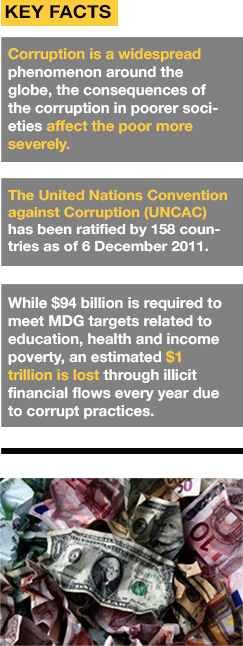
 |
|
 |
 |
 |
 |
 |
 |
 |
| What We Focus On | |||||
| Governance & Corruption |  |
|||
| “When public money is stolen for private gain, it means fewer resources to build schools, hospitals, roads and water treatment facilities. When foreign aid is diverted into private bank accounts, major infrastructure projects come to a halt. Corruption enables fake or substandard medicines to be dumped on the market, and hazardous waste to be dumped in landfill sites and in oceans. The vulnerable suffer first and worst.” Ban Ki-moon, UN Secretary-General, on International Anti-Corruption Day 2009 |
||||
| Good governance and political stability are essential to fighting against extreme poverty. In sub-Saharan Africa, tackling corruption is a way to strengthen preventive capacities to stop leakages of public resources. Corruption is a complex phenomenon deeply rooted in bureaucratic and political institutions. The main pattern of corruption practice is seen in large public sector contracts and concessions issued to private companies. Bribes are estimated to run to about $80 billion per year. Also, depraved business practices place barriers for proper business culture to develop. A considerable amount of foreign aid goes into the pockets of corrupted government officials in many poor countries, and bribery keeps the poor from food, water, medical services, and education they desperately need. According to the Transparency International’s 2010 report, 60% of the world population responded that corruption had increased in the last three years, and 50% of people think their government's approach to tackle corruption was ineffective. Reliable and solid political structure that ensures good governance is required for more balanced development. In many developing countries, corruption reduction has often been regarded as a critical hindrance to sustainable development. To make it worse, corruption is one of the reasons that make developing countries less attractive for foreign investors, and less foreign investment implies deferred development. Despite increasing democracy and stability in sub-Saharan Africa, corruption in governments and conflicts represent serious barriers to ending extreme poverty in many impoverished countries. Sub-Saharan African countries lose $148 billion each year as a result of corruption. Transparency and good governance are essential in poverty alleviation and development in impoverished countries. Transparency in government should be ensured in order to transform temporary aid into long term changes. Transparency can be achieved when people in less-developed countries access to information and resources. |
 |
|||
|
GP3 Korea 2013. Creative Commons Attribution-Non Commercial-ShareAlike 2.0 License The Global Poverty Public Awareness Project in Korea. Designed by Jeong-ae Lee, Ranhee Kim, Suk-hwan Lim, Jaewoo Choi, Ji-won Oh & Seung-won Baek |